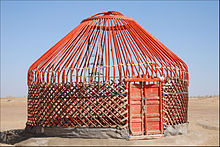Karakalpaks
Many accounts continue to link the present-day Karakalpaks with the Turkic confederation known as the Cherniye Klobuki of the 11th century, whose name also means "black hat" in Russian.
The largest communities live in Nukus, the capital of Karakalpakstan and the surrounding large towns, such as Khodjeyli, Shimbay, Takhiatash, Shomanay and Kungrad.
They are increasingly being outnumbered by Uzbeks, many of whom are being encouraged to move into the rich agricultural region around Turtkul and Beruniy.
Many rural Karakalpaks have been seriously affected by the desiccation of the Aral Sea, which has destroyed the local fishing industry along with much of the grazing and agricultural land in the north of the delta.
The majority of Karakalpakstan is occupied by desert: the Kyzyl Kum on the eastern side, the barren Ustyurt Plateau to the west and now the growing Aralkum to the north, once the bed of the former Aral Sea.
The religious order that established the strongest relationship with the people of the region is the Kubrawiya, which has Shi'i adherents.
Since ancient times, among the Karakalpaks, legends and traditions have been told and passed down from generation to generation about the origin of the tribes and peoples who inhabited Khorezm, about Kayumars, Jamshid, Siyavush, Rustam, Tomiris, Iskander (Alexander the Great), about the female kingdom, Mount Tok, Genghis Khan, Guldursun, Dede Korkut.
The poor were hired as farm laborers by the rich and by officials, which testified to the strengthening of class stratification and contradictions between the Karakalpaks.
In the 18th century Along with rich oral folk art, a literary heritage itself arose, which had specific creative features, the authors of which were known.
Poems differ from folklore in certain ways in terms of theme, style, realism and are in the nature of written literature.
It formed the ideological essence of the works of such major representatives of Karakalpak classical poetry of the 19th century as Ajiniyaz, Berdakh.
The anecdotes Joker Omirbek, a defender of the poor and a wit, a follower of Khoja Nasreddin, were actively retold.
